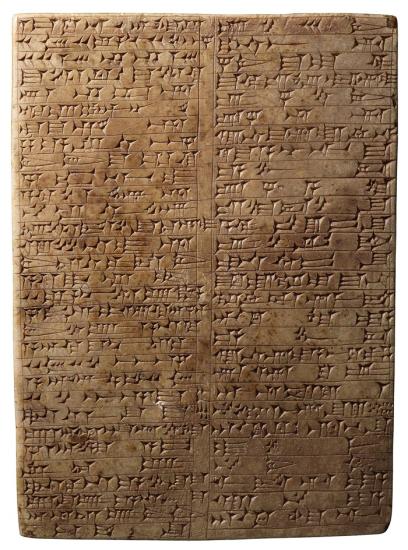
Stone Foundation Tablet with a Historical Inscription of King Tukulti-Ninurta I in Assyrian
Lent in memory of Morris Dorsky
Tukulti-Ninurta I, whose name means "my trust is in (the warrior god) Ninurta," was the first king of Assyria not to respect the sanctity of the city of Babylon. Claiming almost divine honors, he took its defeated king as well as the statue of Marduk, its god, into captivity in order to ensure complete Assyrian supremacy over Mesopotamia. At Assur, the Assyrian capital, he undertook extensive building programs, including the restoration of the Ishtar Temple referred to in this tablet. (For a complete translation of the tablet, see the back of the panel.) Because of his sacrilege and excesses, things did not end well for Tukulti-Ninurta. His son and successor imprisoned him in and set fire to the new capital he built across the river from Assur.
(1–23) Tukulti-Ninurta, king of the universe, strong king, king of Assyria, king of kings, lord of lords, ruler of rulers, prince, lord of all, conqueror of the rebellious—those who do not submit to (him and) who are hostile to Ashur—, defeater of the princes of the Qutu as far as the land Mehru, disperser of the forces of the land of the Shubaru and the remote lands Nairi as far as the border of Makan, strong king, capable in battle, the one who shepherds the four quarters at the heels of the god Shamash (am) I; son of Shalmaneser, king of the universe, king of Assyria; son of Adad-narari (who was) also king of the universe (and) king of Assyria.
(24–50) At that time the temple of the Assyrian Ishtar, my mistress, which Ilu-shumma, my forefather, the prince, had previously built—that temple had become dilapidated, and I cleared away its debris. I changed its site. I founded (it) in another place. I made it more outstanding than ever before. As an addition I built the room of the shahuru and lofty towers. I completed that temple from top to bottom. I built within it a lofty dais (and) an awesome sanctuary for the abode of the goddess Ishtar, my mistress, and I deposited my monumental inscription.
(51–55) May a future prince restore it (and) return my inscribed name to its place! The goddess Ishtar will listen to his prayers.
(56–65) As for the one who removes my inscription and my name: May the goddess Ishtar, my mistress, extinguish his sovereignty, break his weapon, cause his manhood to dwindle away, (and) hand him over to his enemies!
